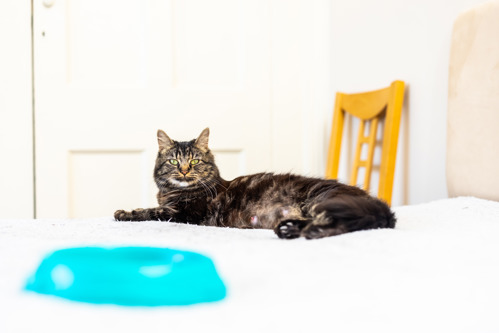Speak to your vet if your cat has not eaten for over 24 hours
As cat owners, we want to ensure that our furry friends are healthy, happy and well-fed. But life can sometimes be unpredictable. Your cat may be a fussy eater, have a sudden illness, or refuse food for unknown reasons. This may lead you to wonder, how long can cats go without food?

Our vet experts explain how long cats can survive without food or water, and the dangers of starvation and dehydration in cats.
How long can a cat go without food?
A healthy adult cat can technically live without food for up to two weeks if they have access to water. But going two days without eating can cause serious health problems for your cat. How long your cat can last without food will also depend on various factors listed below.
How long can cats go without water?
The average time a cat can survive without water is three to four days. But they will become dehydrated within 24 hours. Dehydration causes stress on a cat’s organs, which can lead to other complications including organ failure. If they are also suffering from vomiting or diarrhoea while not drinking, they will become dehydrated quicker. How long your cat can last without water will also depend on various factors listed below.
Factors that influence how long a cat can go without eating and drinking
The amount of time a cat can survive without food or water depends on:
- age. Kittens and senior cats are more vulnerable to the effects of starvation and dehydration
- health. Cats with underlying health conditions, such as diabetes, kidney disease, or hyperthyroidism, can deteriorate more quickly if they stop eating or drinking
- body weight. Overweight cats may have more fat reserves, but this can also put them at higher risk of developing fatty liver syndrome. Find out more about this below
- hydration. Cats that are drinking water may survive longer without food, compared to cats who are not eating or drinking
- temperature. If it is a hot day, cats will become dehydrated more quickly
When to call the vet
If your cat has missed one meal, you should watch them closely and try and tempt them to eat. The occasional ‘off day’ where they don’t eat is not too worrying for an otherwise healthy cat. You should call your vet if your cat:
- doesn’t eat for over 24 hours
- doesn’t drink for over 24 hours
- has skipped a meal and also not drunk any water
- is suffering from vomiting or diarrhoea while not drinking
- is very lethargic, vomiting repeatedly or showing other worrying symptoms
- eats significantly less than usual. This may be a sign of a health problem
The earlier your cat gets help from a vet the better, before any damage is done to their internal organs. By acting fast and ensuring your cat receives the proper care, you can help prevent any complications.
How long can kittens go without food and water?
How long kittens can survive without food and water depends on how old they are. Kittens will become unwell much quicker than most adult cats.
Very young kittens who are not weaned onto solid food cannot go more than a few hours without milk. Older kittens may survive a couple of days without food, but some will become weak and ill after just 12 hours. Older kittens can only survive for up to 24 hours without water.
If your kitten has not eaten for 12 to 24 hours or drunk water for 12 hours they should be seen by a vet as soon as possible. Sooner if they are vomiting or have diarrhoea.
Find out more about caring for kittens.
What happens if a cat doesn’t eat?
After around two to seven days of not eating, your cat’s body will start to break down fat reserves for energy. The broken-down fat will then start to accumulate in the liver and prevent it from working properly. This is a dangerous condition called hepatic lipidosis, also known as fatty liver syndrome. This is a potentially fatal liver disease if not treated quickly. It is often seen in overweight cats who stop eating suddenly.
Early signs of hepatic lipidosis include:
- jaundice (yellowing of the eyes and skin)
- lethargy
- vomiting
- rapid weight loss
Speak to your vet if you notice any of these signs.
Why has my cat stopped eating?
Cats don’t stop eating without a good reason. A healthy cat will eat regularly, even the picky eaters. Potential reasons why your cat may not be eating include:
- dental disease
- pain
- illnesses such as kidney disease and diabetes
- nausea
- fever
- vomiting and diarrhoea
- stress
- blockage or foreign body in the gastrointestinal tract
Speak to your vet to find out the reason why your cat has stopped eating.



